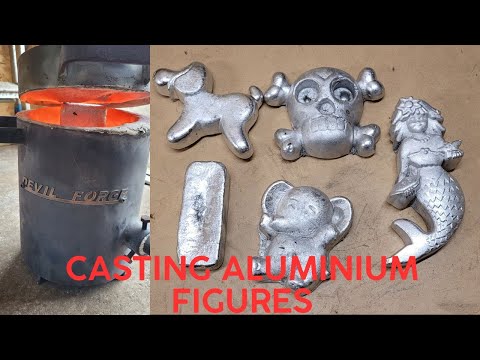Alcast Company Fundamentals Explained
Alcast Company Fundamentals Explained
Blog Article
Some Known Facts About Alcast Company.
Table of ContentsSome Known Factual Statements About Alcast Company Alcast Company Can Be Fun For AnyoneSome Ideas on Alcast Company You Should KnowThe smart Trick of Alcast Company That Nobody is DiscussingIndicators on Alcast Company You Need To KnowWhat Does Alcast Company Mean?
The refined difference hinges on the chemical material. Chemical Contrast of Cast Aluminum Alloys Silicon promotes castability by decreasing the alloy's melting temperature level and improving fluidity throughout casting. It plays an essential duty in enabling elaborate mold and mildews to be filled up accurately. In addition, silicon contributes to the alloy's strength and put on resistance, making it valuable in applications where toughness is vital, such as automotive parts and engine elements.It additionally improves the machinability of the alloy, making it less complicated to refine into finished products. In this means, iron contributes to the total workability of aluminum alloys.
Manganese adds to the strength of light weight aluminum alloys and improves workability. Magnesium is a light-weight element that provides toughness and influence resistance to light weight aluminum alloys.
The Basic Principles Of Alcast Company
It permits the manufacturing of light-weight parts with exceptional mechanical properties. Zinc improves the castability of aluminum alloys and helps manage the solidification process during casting. It improves the alloy's toughness and hardness. It is often discovered in applications where complex forms and great information are required, such as attractive spreadings and certain auto components.

The key thermal conductivity, tensile toughness, return toughness, and elongation vary. Among the above alloys, A356 has the highest possible thermal conductivity, and A380 and ADC12 have the most affordable.
The Only Guide for Alcast Company

In precision spreading, 6063 is appropriate for applications where intricate geometries and premium surface area finishes are paramount. Examples consist of telecommunication rooms, where the alloy's superior formability enables streamlined and aesthetically pleasing styles while preserving architectural integrity. Likewise, in the Lighting Solutions industry, precision-cast 6063 elements produce elegant and reliable lights fixtures that require detailed forms and good thermal efficiency.
It leads to a finer surface finish and far better corrosion resistance in A360. Additionally, the A360 shows exceptional elongation, making it excellent for complex and thin-walled elements. In accuracy casting applications, A360 is fit for industries such as Customer Electronics, Telecommunication, and Power Devices. Its enhanced fluidity permits for intricate, high-precision components like mobile phone coverings and interaction tool housings.
7 Simple Techniques For Alcast Company
Its distinct residential properties make A360 a beneficial option for precision here are the findings casting in these markets, improving item resilience and high quality. Casting Foundry. Light weight aluminum alloy 380, or A380, is a widely utilized spreading alloy with several distinctive features.
In precision spreading, light weight aluminum 413 radiates in the Consumer Electronics and Power Devices markets. It's commonly utilized to craft detailed elements like mobile phone real estates, camera bodies, and power device housings. Its precision is exceptional, with tight tolerances approximately 0.01 mm, ensuring remarkable item setting up. This alloy's remarkable corrosion resistance makes it a superb option for outdoor applications, guaranteeing resilient, sturdy items in the pointed out markets.
Alcast Company Can Be Fun For Everyone
As soon as you have actually determined that the light weight aluminum die casting process is appropriate for your task, a crucial following action is choosing on one of the most proper alloy. The light weight aluminum alloy you pick will significantly affect both the spreading procedure and the homes of the end product. As a result of this, you have to make your choice very carefully and take an informed strategy.
Identifying the most appropriate aluminum alloy for your application will mean evaluating a wide array of characteristics. These comparative alloy attributes comply with the North American Die Casting Association's guidelines, and we've divided them into two classifications. The initial classification addresses alloy attributes that impact the production procedure. The 2nd covers qualities impacting the residential or commercial properties of the last item.
Alcast Company Can Be Fun For Anyone
The alloy you choose for die casting straight influences a number of elements of the casting process, like exactly how simple the alloy is to deal with and if it is vulnerable to casting issues. Warm breaking, additionally understood as solidification cracking, is a normal die spreading issue for aluminum alloys that can lead to inner or surface-level tears or splits.
Certain aluminum alloys are extra vulnerable to warm breaking than others, and your selection should consider this. Another typical problem found in the die spreading of aluminum is die soldering, which is when the cast sticks to the die walls and makes ejection hard. It can damage both the actors and the die, so you need to try to find alloys with high anti-soldering properties.
Corrosion resistance, which is currently a noteworthy characteristic of aluminum, can vary substantially from alloy to alloy and is a crucial particular to consider depending upon the environmental problems your product will certainly be exposed to (aluminum metal casting). Use resistance is one more building generally looked for in light weight aluminum items and can differentiate some alloys
Report this page